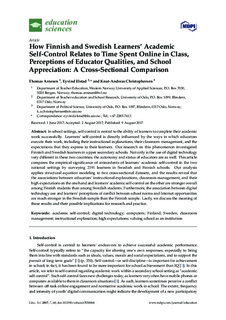| dc.contributor.author | Arnesen, Thomas | |
| dc.contributor.author | Elstad, Eyvind | |
| dc.contributor.author | Christophersen, Knut-Andreas | |
| dc.coverage.spatial | Scandinavia | nb_NO |
| dc.date.accessioned | 2019-03-28T12:24:56Z | |
| dc.date.available | 2019-03-28T12:24:56Z | |
| dc.date.created | 2017-11-20T09:04:24Z | |
| dc.date.issued | 2017 | |
| dc.identifier.citation | Arnesen, T., Elstad, E. & Christophersen, K.-A. (2017). How Finnish and Swedish learners’ academic self-control relates to time spent online in class, perceptions of educator qualities, and school appreciation: A cross-sectional comparison. Education Sciences, 7(3). | nb_NO |
| dc.identifier.issn | 2227-7102 | |
| dc.identifier.uri | http://hdl.handle.net/11250/2592209 | |
| dc.description.abstract | In school settings, self-control is central to the ability of learners to complete their academic work successfully. Learners’ self-control is directly influenced by the ways in which educators execute their work, including their instructional explanations, their classroom management, and the expectations that they express to their learners. Our research on this phenomenon investigated Finnish and Swedish learners in upper secondary schools. Not only is the use of digital technology very different in these two countries; the autonomy and status of educators are as well. This article compares the empirical significance of antecedents of learners’ academic self-control in the two national settings by surveying 2191 learners in Swedish and Finnish schools. Our analysis applies structural equation modeling to two cross-sectional datasets, and the results reveal that the associations between educators’ instructional explanations, classroom management, and their high expectations on the one hand and learners’ academic self-control on the other are stronger overall among Finnish students than among Swedish students. Furthermore, the association between digital technology use and learners’ perceptions of conflict between school norms and Internet opportunities are much stronger in the Swedish sample than the Finnish sample. Lastly, we discuss the meaning of these results and their possible implications for research and practice. | nb_NO |
| dc.language.iso | eng | nb_NO |
| dc.publisher | MDPI | nb_NO |
| dc.relation.uri | http://www.mdpi.com/2227-7102/7/3/68/pdf | |
| dc.rights | Navngivelse 4.0 Internasjonal | * |
| dc.rights.uri | http://creativecommons.org/licenses/by/4.0/deed.no | * |
| dc.subject | academic self-control | nb_NO |
| dc.subject | digital technology | nb_NO |
| dc.subject | computers | nb_NO |
| dc.subject | Finland | nb_NO |
| dc.subject | Sweden | nb_NO |
| dc.subject | classroom management | nb_NO |
| dc.subject | instructional explanation | nb_NO |
| dc.subject | valuing school as an institution | nb_NO |
| dc.title | How Finnish and Swedish learners’ academic self-control relates to time spent online in class, perceptions of educator qualities, and school appreciation: A cross-sectional comparison | nb_NO |
| dc.type | Journal article | nb_NO |
| dc.type | Peer reviewed | nb_NO |
| dc.description.version | publishedVersion | nb_NO |
| dc.rights.holder | © 2017 by the authors. | nb_NO |
| dc.subject.nsi | VDP::Samfunnsvitenskap: 200::Pedagogiske fag: 280 | nb_NO |
| dc.source.pagenumber | 1-12 | nb_NO |
| dc.source.volume | 7 | nb_NO |
| dc.source.journal | Education Sciences | nb_NO |
| dc.source.issue | 3 | nb_NO |
| dc.identifier.doi | 10.3390/educsci7030068 | |
| dc.identifier.cristin | 1515876 | |
| dc.relation.project | Norges forskningsråd: 218245 | nb_NO |
| cristin.unitcode | 203,6,1,0 | |
| cristin.unitname | Avdeling for lærarutdanning og kulturfag - Stord/Haugesund | |
| cristin.ispublished | true | |
| cristin.fulltext | original | |
| cristin.qualitycode | 1 | |

